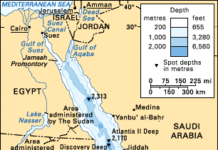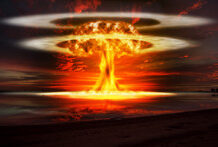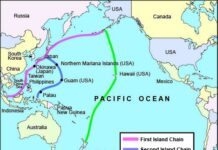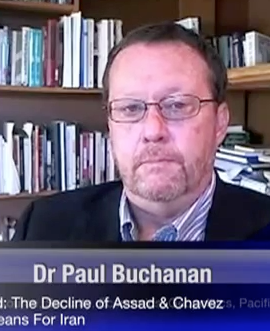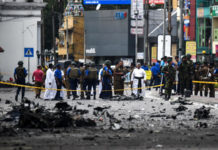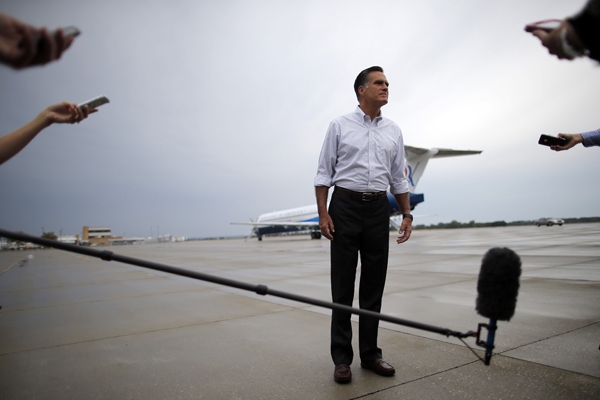Analytic Brief: A Romney Foreign Policy in the Southwestern Pacific.
Analysis – By Dr. Paul G. Buchanan.
 The 2012 US presidential election is focused on economic policy and management, but foreign policy issues have crept into the campaign. The US relationship with Israel, Iran, China, the Arab Middle East and Russia have become the subject of debate between President Obama and the Republican challenger, former Massachusetts governor Mitt Romney. Although Mr. Romney trails in the polls less than two months from the election date, it is worth considering what his election could mean for the US approach to the South and Western Pacific. In this brief 36th Parallel Assessments outlines the conceptual strands informing the Romney foreign policy perspective, then moves to analysis of what it means for future US-Pacific relations.
The 2012 US presidential election is focused on economic policy and management, but foreign policy issues have crept into the campaign. The US relationship with Israel, Iran, China, the Arab Middle East and Russia have become the subject of debate between President Obama and the Republican challenger, former Massachusetts governor Mitt Romney. Although Mr. Romney trails in the polls less than two months from the election date, it is worth considering what his election could mean for the US approach to the South and Western Pacific. In this brief 36th Parallel Assessments outlines the conceptual strands informing the Romney foreign policy perspective, then moves to analysis of what it means for future US-Pacific relations.
The core foreign policy approach of the Republican Party has traditionally been realism. Because of the exigencies of the Cold War and its aftermath, Republican realism in practice has had “soft” and “hard” as well as neo-realist variants (in the latter economic power takes precedence over military power in the promotion of national interests). During the Cold War the soft and hard realist versions were applied by presidents Eisenhower and Nixon according to strategic circumstances and diplomatic necessity so that nuance could be achieved in the conduct of US foreign affairs. Hard realist approaches involve the application of power based on self-interest. Soft realist approaches mitigate the application of power with non-interest based concerns, such as through the provision of humanitarian assistance to non-strategically important countries. For the Republican Party in the late 20th century, the key was to balance the hard, soft and neo-realist approaches to world affairs. Notable Republican realists include Henry Kissinger, George Schultz, Brent Scowcroft and more recently the strategist Robert Kagan and economist Robert Zoellick.
Beginning in the 1970s, a line of thought emerged in US politics that came to be known as neo-conservative. Not be confused with neo-liberalism, which is an economic school that follows the monetarist prescription of Friedrich Hayek and Milton Friedman, neo-conservatism is an ideology that extols the moral superiority of “American” values and with that the necessary role of the US as the world’s diplomatic arbiter and systems regulator. This requires US preeminence in economics, diplomacy and international security affairs. The vision is eminently idealist in that it speaks to a higher purpose behind American exceptionalism, but is not equivalent to the idealism so often associated with pacifists and traditional political liberals. Prominent neo-conservatives include the late Jeanne Kirkpatrick, Dick Cheney, Richard Perle, Dan Senor, Paul Wolfowitz, John Bolton and Elliot Abrams.
Neo-conservatism gained ground within the Republican Party during the Reagan presidency but saw its influence reduced under the George H. Bush administration (the first president Bush was a committed realist who had an extraordinary amount of experience in international affairs and US foreign policy. He was particularly unimpressed with the neo-conservative desire to re-shape the world in the preferred American image).
In the late 1990s neo-conservatism came back with renewed vigor under the auspices of the Project for a New American Century, which provided the foundations of the George W. Bush foreign policy, particularly after September 11, 2001. Believing that the US continues to be the world’s greatest nation and that its decline is relative, can be arrested and is the product of political failures by Democrats, the neo-conservative approach to foreign policy is interventionist and uni- or bi-lateral in focus. It places great emphasis on asserting US “exceptionalism” via military diplomacy, moral supremacy and economic self-reliance.
Like president Obama before his election, Mitt Romney has virtually no foreign policy experience and is considered to possess a cautious, pragmatic, results-oriented personality. But the similarities end there. Mr. Obama understands the constraints on US power in an increasingly multipolar world (where complete national economic self-reliance is difficult to achieve), whereas Mr. Romney adheres to the belief in American exceptionalism and its continued powers of moral authority on the world stage. He has reconciled his beliefs in the field of foreign policy by appointing a mixture of realists and neo-conservatives to his advisory team. The former include Zoellick, Kagan and William Kristol (and to a lesser extent John McCain), while the latter include Bolton, Wolfowitz , Senor and former ambassador Richard Williamson. Although not working on his campaign, Romney is believed to seek the occasional counsel of Henry Kissinger and Condoleeza Rice (a Sovietologist by training) when necessary.
The general consensus is that Mr. Romney is less evangelical than his neo-conservative advisors, but less pragmatic than his realist counsels. His foreign policy stance is formally based on “American leadership and peace through strength.” However, during the election campaign he has genuflected to the Tea Party movement and conservative Christians in the electorate who are now the core of the Republican base by adopting neo-conservative rhetoric on issues such as Iran, Israel and China.
This is not uncommon, as presidential candidates often take more extreme positions on issues of policy while campaigning, then moderate those positions once confronted with the pressures of office (as was the case with president Obama). The question is whether Mr. Romney will jettison the neo-conservative approach if he is elected (which many believe will be the case), or whether the neo-conservatives will be given pride of place in his foreign policy team as a reward for their work in shoring up the Republican base during the campaign.
The bigger issue is that in the words of journalist Bob Woodward, the Republican Party is “at war with itself.” It may be impolitic to say, but the Tea Party tail is wagging the GOP dog, and moderate Republicans–that is, those who were economic and social liberals but security conservatives (hence their realism)–are not only a dying breed but increasingly unwelcome in their traditional party of choice. This forces candidates like Mr. Romney, who is an economic liberal but perhaps more of a social and security conservative than the old “Rockefeller Republicans,” to bow to the nationalistic, isolationist yet internationally messianic Right (a contradiction, to be sure, but that is what the Tea Party movement is). Should he win the election, Mr. Romney will find himself trying to arbitrate the internecine war within the GOP by balancing his cabinet choices. One way of doing so is to have a neo-conservative as Secretary of State and a realist as Secretary of Defense (since Pentagon realism could provide a check on the State Department’s evangelical and interventionist ambitions).
If elected it can be expected that Mr. Romney will continue to advance the US “pivot” towards Asia announced by President Obama. He will, however, have a more militaristic edge to his agenda vis a vis the PRC, as he appears to tie trade and security relations much more tightly than Obama has done and has spoken of confronting China as a trade cheat and military rival. He will re-focus US attention on Russia, which in a Cold War throw-back he has called the “greatest geopolitical threat” to the US. He will reaffirm US support for Israel, to include its position on occupied territories, negotiations with Palestinian authorities and dealing with Iran (in fact some analysts have suggested that Romney’s personal friendship with Israeli Prime Minister Benjamin Netanyahu has essentially allowed the latter to dictate the candidate’s approach to the Middle East).
Should individuals like John Bolton or Dan Senor be given senior cabinet positions, the possibility of armed conflict with Iran will increase significantly (Bolton, who was US UN ambassador during George W. Bush’s first presidential term and Dan Senor, who was a senior advisor and chief spokesman in Paul Bremmer’s Coalition Provisional Authority (CPA) administration of occupied Iran, are both staunch hawks with regard to Iran and have called for pre-emptive strikes on it to prevent it from acquiring nuclear weapons).

Photo Source: Bet.com
It should be noted that Mr. Romney does not have any high profile (ex) military leaders publicly working with his campaign, which leaves it to his civilian advisors to define his security policy. Since the neo-conservatives he is surrounded with are known as “chicken hawks” due to their aversion for military service but advocacy of military interventionism, this places him in the unfortunate dilemma of not having experienced military people vetting some of the more risky policies his advisors advocate.
Because Republicans are not as enthused about multilateral institutions and approaches in international affairs, and because the conservative Right in the US views them with hostility, a re-emphasis on bilateral initiatives and relations can be expected under a Romney presidency. His administration would not abandon multilateralism entirely, especially in the case of ongoing initiatives such as the Trans-Pacific Partnership negotiations or International Security Assistance Force draw-down in Afghanistan. If elected, Mr. Romney will reverse the Obama defense cuts currently under discussion, as both sides of his foreign policy team foresee an increased military nature to the competition with China along with the emergence of new state-based security threats in an age of rapidly evolving lethal technologies. He will continue to employ the Obama’s counter-insurgency strategy against irregular threats, which consists of a “drones and bones” approach where unmanned aerial vehicles and small teams of special operations troops are used to track and hunt down Islamic militants world-wide with or without the cooperation of local governments.
Two areas of agreement between Romney’s foreign policy advisors are the myth of America’s decline and and with regard to the increasingly multipolar nature of the international community. Republican realists and neo-conservatives do not see the US as being in irreversible decline and do not see the rise of middle powers such as those encompassed in the so-called BRICs coming anywhere close to a true multipolar balance of power. They note that the US is still the world’s greatest manufacturing power, the largest trading nation, the core of the world financial system, a leader in aerospace, telecommunications and robotic technologies, and the preferred trade and security partner for a majority of nations, to include some of the newly emerging regional powers. They all concur that unlike the Obama administration’s purported “leading from behind” approach (where the US supports and encourages international endeavors but does not attempt to take the lead in every foreign policy situation), the US is at the very least duty-bound to lead the international community, if not chart the course of international affairs.
Compared with other regions, the approach to the Southwest Pacific will be less effected by a change to a Romney administration, but there will be changes nevertheless. The US will take a stronger line on Chinese influence in the Pacific, which will include reassertion of US naval dominance in the South Pacific waterways and sea lanes of communication used by the Chinese for trade and the prioritization of US defense ties to the countries surrounding China. This ramping up of regional security ties will be aided by the recent US-Australia and US-New Zealand security agreements, which have bolstered the US military relationship with both countries while promoting greater burden sharing by them. As part of its enhanced commitment to bilateral defense ties in the Western Pacific, the US will continue to work to cement its chain of security partners throughout the region, which now include Japan, Taiwan, South Korea, Thailand, the Philippines, Brunei, Singapore and Indonesia as well as Australia and New Zealand (the US is also pursuing improved security ties with Malaysia and Vietnam, both of whom have their own concerns about Chinese regional expansionism and in the Vietnamese case a history of enmity with its larger neighbor).
The US will continue to engage Fiji as it moves to elections in 2014, but its main objective will be to counterbalance Chinese inroads in that country under the Bainimarama regime. This effort will be given additional priority due to the expanding Russian ties to the Fijian regime. Likewise, the US will seek to counter improved Sino-Samoan ties by increasing its engagement with the latter (this will include addressing issues of Western Samoans working in and with American Samoan firms). The biggest objective for the US and its main ally, Australia, will be to increase US and Australian influence in the Solomons and Papua New Guinea now that those countries’ on- and off-shore mineral resources are fully exploitable. The scramble for resource sector investment supremacy is on, and since Chinese firms already are involved in resource extractive ventures in these countries as well as other Pacific Island states, Romney’s priority task will be to promote US and Australian commercial interests as the chief competitors to Chinese firms. All of these initiatives are already in place under the Obama administration, but a Romney presidency can be expected to reinforce and accentuate them.
Under a Romney presidency the US would place more emphasis on its individual relations with Pacific countries and less emphasis on regional organizations such as the PIF and SPC. Republicans have questioned the utility of developmental assistance to non-strategic or chronically under-developed nations, so it can be expected that those questions will reverberate in Romney’s foreign policy approach to the South Pacific.
Depending on whether neo-conservatives or realists dominate foreign policy decision-making in a Romney administration, there is the possibility of tensions with China increasing within the region. Neo-conservatives will attempt to reassert the preeminence of US values and US interests using a harder edged approach than that preferred by the realists, who will continue to emphasize a soft power approach in a region where the PRC cannot yet compete militarily but in which it has much diplomatic and economic clout. The neo-conservatives will drive a harder bargain on Pacific Island Countries when it comes to aid and developmental assistance, although this may prove counter-productive given the inroads the Chinese have already made in the region.
The larger point is that with neo-conservatives at the US foreign policy helm, overall tensions within the region will likely increase as the US toughens its unspoken containment policy vis a vis the Chinese. Should realists control US foreign policy under Mr. Romney, than a continuation of the Obama administration’s “smart” power approach is likely to continue without much alteration, albeit with an increased military emphasis.
Links.
- Reuters.com – USA Campaign Romney
- Policymic.com – Mitt Romney Foreign Policy
- Rightweb.irc-online.org – Romneys Foreign Policy
- Guardian.co.uk – Mitt Romney Foreign Policy
- VOAnews.com – Romney Foreign Policy
- Foreignpolicy.com – Mitt Romney
- Chathamhouse.org – International Affairs (pdf)
- Mittromney.com – China East Asia



